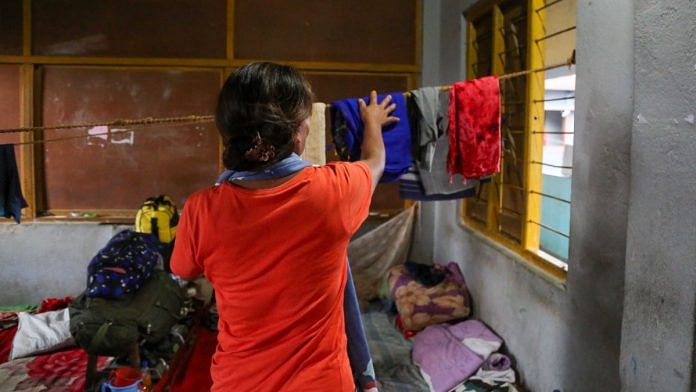Women’s bodies have long been the battleground for conflicts, where rape and torture are orchestrated combat tools used to inflict continuous, visceral suffering on the survivors. The violence is intended not only to punish and discipline the targeted women but also to make an impact on the larger community and the gazing crowd.
A distressing incident in Manipur exemplifies this pattern of violence. Three women were paraded naked and sexually assaulted by a mob of men on 4 May, a day after clashes broke out between Kuki and Meitei communities in the state. The video of the incident, which has recently surfaced, shows men dragging the women into a field, seeking ‘revenge’ for crimes allegedly committed by their community—a piece of fake news that was circulated just before the violence broke out.
With their lives already upended by the ongoing tensions in Manipur, women’s bodies have now become the totems of community victory. Such acts of sexual violence are not unique to Manipur; they occur in conflicts worldwide. Throughout modern history, punishment and retribution for political contests between communities, whether it is over territory or political hegemony, have often targeted the female body. In Manipur, the women were forced to enact public rituals of degradation, stripped of everything that is part of the social contract. The video that went ‘viral’ reinforces how crimes of sexual violence are choreographed, produced, and circulated as trophies of community triumph.
The ill-informed but commonplace myth about the Northeast of India being a kinder place for women has collapsed. It is essential to remember that women in the region have always paid a price for movements of ethnic identity, whether at the hands of armed actors or those leading these ethnonationalist movements with support from non-state actors.
Armed aggression demands that groups of men risk their humanity and their lives in a circle of offence and counter-offence. How do you get them to do it? Addict them to the cult of masculinity. Get them to pilfer, kill, and conquer. And in a continuum, control women. In a culture where the honour of a family and community resides in a woman’s body, the woman’s body becomes the target. Aim and shoot.
Also read: ‘Begged mob to leave me, said I am a mother’: Kuki woman in viral video recalls 2-hr assault
Prosecuting, not just documenting
The circle of honour that surrounds female bodies weakens us. In this particular instance, the zero FIR that was registered days after the crime had only one complainant—the youngest woman—who alleged rape. Reports of sexual violence in the media after tensions broke out in Manipur have been circulating. In a state where women are often positioned and mobilised as foot soldiers of every movement, this is telling. The survivors don’t confirm sexual violence due to the lack of safe spaces and support. Additionally, the stigma attached to being raped and considered unfit for another man contributes to their silence. Perhaps there is more to it. Their bodies are now contested territory, and very often men take the ownership of being the spokesperson of the community.
But documentation of such sexual violence is crucial to let survivors know they are not alone and not at fault, and to compel institutions to hold perpetrators accountable. The violation of our bodies cannot be relegated to the private; we need to reassert sexual violence in conflict as public and political, so that it is subjected to prosecution. Despite sexual violence in conflict being named and codified, we have rarely seen prosecution go beyond the paper into real life.
The ignominy of sexual violence in conflict isn’t the woman’s burden to bear, and neither can accountability be dissolved by relegating the perpetuators to a mindless ‘mob’. It’s a lazy, academic categorisation that we as a society mustn’t stand for. We cannot reduce or excuse such gang mentality as innate tendencies or human nature. These mobs have purposeful goals, and their intent is clearly structured and coherent. We need to hold accountability as a polity, and acknowledge that women’s lives and bodies have been casualties of wars and conflicts that they didn’t start or agree to fight. By ensuring culpability and swift punishment, we can at least begin to limit the conflict to those who want to fight it.
As we watch two communities slip into retrograde in violence-ridden Manipur, all compacts of social and political tolerance decimated, one begins to wonder if post-violence and post-conflict social repair will ever be possible in these marginal lands, where both communities are fighting over establishing ‘difference’ via the homogeneity of categorisation as Schedule Tribe. One also wonders if relationality can ever be adopted as a living political practice among these marginal yet contesting identities.
Aditi Narayani is an assistant professor of sociology at Lakshmibai College, Delhi University. She tweets @AditiNarayani.
Naorem Anuja is a research scholar, JNU. She tweets @NaoremAnuja.
Views are personal.
(Edited by Prashant)



